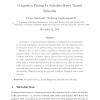Free Online Productivity Tools
i2Speak
i2Symbol
i2OCR
iTex2Img
iWeb2Print
iWeb2Shot
i2Type
iPdf2Split
iPdf2Merge
i2Bopomofo
i2Arabic
i2Style
i2Image
i2PDF
iLatex2Rtf
Sci2ools
115
click to vote
TRANSCI
2010
2010
Congestion Pricing for Schedule-Based Transit Networks
In this paper, we develop models for adjusting or setting fares on a transit system to encourage passengers to choose travel strategies that lead to the least travel delay for the entire system. In our problem setting, these fares vary with time of day. Similar to the one used to reduce congestion on vehicular traffic networks, our goal is to adjust or set fares so that a user equilibrium solution under the new fares yields the least delay or is system optimal. On the other hand, pricing frameworks for traffic networks such as marginal cost pricing do not readily apply because the travel delay in transit systems involves factors different from those in vehicular traffic and cannot be expressed in closed functional forms. The models herein are scheduled-based and account for loading priorities and individual vehicle capacities explicitly. Differences among the proposed models are illustrated with a small network.
Fares | TRANSCI 2010 | Transit Systems | Travel Delay |
| Added | 31 Jan 2011 |
| Updated | 31 Jan 2011 |
| Type | Journal |
| Year | 2010 |
| Where | TRANSCI |
| Authors | Younes Hamdouch, Siriphong Lawphongpanich |
Comments (0)

